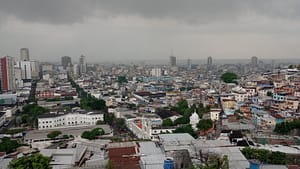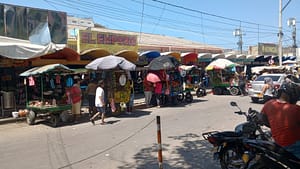This text appeared in the annual newsletter of the German Association for Social-Cultural Work (Verband für sozial-kulturelle Arbeit 2024).
Democracy in Crisis
In 2025, democracy in Europe finds itself in a deep crisis. Even though it is not the first one, it appears particularly severe and troubling; on one hand, political movements that fundamentally question the system are paradoxically gaining significant traction through democratic means. For instance, the AfD has seen an increase in its voter base recently, despite routinely calling for the overthrow of parliamentary order and the party system. Furthermore, the crisis is characterized by its reach – Viktor Orbán and Fidesz in Hungary, PiS in Poland, Marine Le Pen and Rassemblement National in France, Geert Wilders and Partij voor de Vrijheid in the Netherlands, Giorgia Meloni and Fratelli d’Italia in Italy, or Vox in Spain stand out as additional examples. Much attention within this crisis is directed towards the democratic parties, which are under critique for lacking ideas and integrity, acting remote from citizens, and mirroring the rhetoric and programs of anti-democratic forces. For example, in light of the AfD’s successes in Germany, a more restrictive stance regarding migration and asylum can be observed across all parties. The focus on voters on the other hand, appears primarily concerned with reconstructing voting behaviour – investigating the life circumstances and political experiences that lead individuals to mark their ballots at specific points rather than others. Yet it may be essential to consider alternative perspectives to effectively combat this crisis.
Who is the People?
Largely overlooked in the discourse on popular sovereignty is the relationship between the individual and society – the self-determined and collective subject who’s fate democracy ultimately decides. Two general tendencies stand in opposition here. The notion of the Homo Oeconomicus (Knight 1999), who acts solely according to personal needs and interests within a democratic system, contrasts with the broader idea of community, where individuals feel responsible for one another and align their political actions accordingly. The exact understanding of the democratic sovereign – constituted by the people that govern themselves – is continually evolving, subject to negotiation, contested, and controversial (Habermas 1962). Even in Athenian democracy, the central historical reference point, only free male citizens could participate in communal decision-making, while women, slaves, and metics (something as foreigners or newcomers) were excluded by definition. Collectively, these excluded groups represented a significant portion of the population over which decisions were made by others. Therefore, despite the current crisis and put into perspective we can acknowledge that we generally progressed into the right direction. The crucial questions of societal belonging and power – on what bases they rest, their limitations, and to what conditions they are tied – can be complemented by inquiries into how they are experienced and negotiated on an individual level. This is the path we will explore further.
Society as the Sum of Its Parts
Benedict Anderson argues in “Imagined Communities” (1983), his seminal work on the formation of nations, that even in the smallest nation-states, it is impossible to know more than just a tiny fraction of the people with whom one forms a society. Most individuals participating in a democratic process to choose a shared government will never meet or know one another. The relationship among them is largely based on assumed connections. People accept that others that they might never encounter exist in places that they might never visit, but somehow, they are in the same boat. The experiences gained from interactions with some people serve as representations of the whole. The idea of a national society as a union of equals, created as a fate community into which one is typically born, is a common viewpoint – the word nation deriving from the Latin “natio” (people, origin, birth). In recent decades, the idea of later integration through naturalization has gained acceptance but has also sparked resistance and pressures for assimilation. In practice, this union, despite its egalitarian self-conception, is profoundly shaped by inequalities among social classes – systematically privileged, and disadvantaged groups. These inequalities perpetuate each other, leading to disputes about where the boundaries of societal cohesion should be drawn – for example, based on citizenship status, migration experiences, skin color, the location of one’s domicile, community affiliations, or political views.
Public Space – The Common Good
The individual encounter with society and belonging occurs, in part, passively, through media and abstractions (e.g., when encountering reports on “people with migration backgrounds,” “the East Germans,” or “the youth”), but it becomes much more immediate and engaging through active personal interactions in social spaces. Places with public functions, where exchanges between strangers take place – such as parks, cafés, bars, streets, squares, community centers, social services, shopping malls, public transport, and waiting rooms – fulfill a fundamental role in societal genesis, enabling encounters between strangers (Valentine 2008). Relationships between people are experienced and continually reproduced through daily actions. Individuals can present themselves as they are, voice their concerns, and take positions on various topics. They can find like-minded individuals or encounter rejection, hear different perspectives, and form opinions about others. In short, it is primarily in the social space that individuals come together to form a society and recognize themselves as part of it (or not).
Experiencing Differences
At a collective level, society is a continuous negotiation, while individually, it is a learning process. Interactions among people facilitate engagement with social diversity. The struggle with the “other,” regardless of the form of difference, becomes a cognitive stimulus and a foundation for personal growth. Exchanging knowledge and different personal experiences are essential to determining who oneself wants to be. Under favorable conditions, experiencing differences can foster increased tolerance, openness, and (as cliché as it may sound) an expansion of one’s horizons. These are crucial soft skills for thriving in a diverse society within an increasingly fast-paced and steadily further globalizing world. Conversely, under adverse conditions – such as legal inequalities among groups, spatial segregation, marginalization, or extreme power imbalances – social cohabitation can entrench divisions and exacerbate prejudices and animosities (Amin 2002). The lines of separation run along classic social categories: ethnicity, nationality, skin color, language, gender, age, sexual orientation, wealth, educational background, as well as more trivial attributes such as music preferences, sports choices, eating habits, and subcultures. Positive experiences with social diversity on the other hand directly counter the greatest societal divisive force: the fear of the unknown.
Favorable Conditions
Community work operates with an awareness of the importance of social space (Fürst & Hinte 2020). Community centres, in this regard, are unique institutions because they not only acknowledge the social space but also reflect on its impact and actively shape it toward greater inclusivity. They intervene in the ongoing societal negotiation of belonging, responding to social diversity by creating favourable conditions for encounters among strangers, and specifically addressing those individuals facing barriers to social participation. This is achieved amongst others through loneliness prevention, language cafés for migrants, accessibility for disabled people, memory training for older adults, classes for single parents, projects for the homeless, etc. The value of these institutions lies not only in the participation of various individuals but also in ensuring that their involvement and interactions happens on equal footing—self-determined and without the need for compromises in their respective identities. This, in turn, is both a prerequisite and a manifestation of being an equal and active member of society.
Democratic Crisis as a Result of Social Polarization
The ongoing crisis of democracy in Europe is intertwined with societal rifts. While these may differ in detail from one state to another, generally they are all characterized by increasing social polarization and division. The political strategies of anti-democratic forces therefore primarily rely on exclusion and populistic appeals against those whose participation can be put into question. These tactics are then complemented by the blame to a system perceived as responsible for all the ills of society. Fueling fears, explaining complex issues through simple attributions of fault, and pitting segments of the population against the weaker members have proven to be crude yet effective strategies for undermining the democratic system. The weakening of political order results thereby from a disintegration of the democratic sovereign.
A Different World is Always Possible
Despite the gravity of these developments, it is comforting to recognize that they are neither new nor irreversible. The functionality of democracy is contingent on the attitudes of people toward one another, which are, in turn, highly malleable and constantly in flux. Even the most traditional of “ethnic Germans” is a product of a millennia-long cultural and social mixing. Nothing new about it. Just as today’s newcomers, hoping for acceptance, may become tomorrow’s chauvinists, the deepest socio-cultural divisions can surprisingly be bridged when the conditions for this are established. Just recently Germany has already successfully executed a complete social and cultural turnaround from one generation to another. Ultimately, all reactionary tendencies and apocalyptic narratives about outsiders and the “other” cannot change the fact that with the increasing volume of people and communication worldwide, socio-cultural differentiation and mixing will continue and even accelerate. Human identities are becoming increasingly complex, functioning across an ever-growing array of dimensions. And there is nothing that anybody could do about it. Long-term denial of reality on the other hand has never yielded success.



